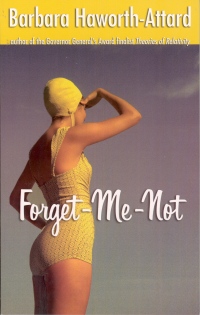| ________________
CM . . .
. Volume XII Number 4 . . . .October 14, 2005
excerpt:
Retaining both a floral title and the diary format of the well-received World War II novel, Love-Lies-Bleeding, Haworth-Attard presents a sequel rich with details of Roberta "Bobby" Harrison's life and family, May through September of 1945, in London, ON. Bobby, now 15, struggles to understand why, with the war against Germany over, returning soldiers like her brother, her best friend's brother, and the men at the hospital where she works appear irrevocably altered and cannot seem to adjust to their previous lives. Brent, recovering from his prisoner of war experiences, explains, "War takes an ordinary man and puts a gun in his hand and asks him to do something extraordinary—to kill. And the first time that person points the gun at another human being and fires, he is changed. Changed forever." Change frustrates and excites Bobby. "I don't understand what's wrong with my family!" she complains. Alex, her favourite brother, home and whole but different, appears content to work at the local aircraft factory, refuses to consider the "Training and Education" offered by government, and develops a relationship with mousy Julia, "mouse-born hair, mouse-brown clothes, squeaky mouse voice." When her brother, Brian, insists on dating her best friend, Nancy, Bobby, much to her dismay, feels compelled to sever her relationship with Nancy for showing such poor judgment. Reluctantly, Bobby accepts that her sister, Caroline, along with her infant, must pack for their move to join her husband on his Australian family's "huge cattle ranch." Aunt Lily's insistence that she prefers a career to marriage and her railing against the factory owners that fire the women workers to open jobs for returning men intrigues Bobby. Dad's bouts of indigestion increase with his concern about a threatened job loss and culminate in his suffering a heart attack. In typical teenage fashion, Bobby blames herself for a myriad of issues and agonizes accordingly. Everything is changing, and Mom's admonition, that "life changes constantly, and we just have to accept that and continue to look forward to tomorrow," fails to encourage Bobby. Bobby vents her frustrations by writing in her diary and writing long conversational letters to her Saskatchewan beau, George, until a local heart throb begins asking her for dates, showers sloppy kisses on her, and demands she "cuddle," apparently determined to exploit her well-endowed charms. Flattered at his attentions yet repelled by his actions, Bobby finally realizes she "really didn't like Rick at all. He may be good looking, but he's not very smart and he's not very nice." Unfortunately, because she feels guilty about seeing Rick, she stops writing to George, and that decision, combined with the loss of her best friend, causes Bobby to be lonely and confused. As if her personal life did not present enough challenges, when Bobby reads newspaper accounts of the Warsaw ghetto, atrocities in concentration camps, POW's, teenagers executed as spies, German prisoners in the area, and the horrific atomic bombing of Hiroshima and Nagasaki, she is appalled and observes that the "in between people" are often those who "sometimes get hurt the most." Bobby's diary teems with a bright and articulate teenager's preoccupations with growing up. She tries to enhance her appearance by using dimple makers, widening her eyes, wearing Cinderella Leg Tan instead of stockings, and perming her hair. She quotes from the Dorothy Dix Advice Column items and struggles to understand the protocols of dating and kissing because she has no one with whom to discuss her confusion. She reveals her exasperation in hilarious diatribes against her uncooperative family members who refuse to follow her script. Deciding that her work at the hospital presages a nursing career, she enthusiastically studies the "A-Z Home Medical Book" and randomly misdiagnoses everyone until her exasperated brother suggests writing might be more her forte. Haworth-Attard infuses the diary entries with humour and wit as Bobby sorts through her daily concerns and difficulties. She presents Bobby's outrage and horror at learning of man's inhumanity to man perceptively and sensitively. Well-paced and sprinkled with historical information, Bobby's diary offers history and sociology in an eminently readable format well suited to young readers. In an "Author's Note," Haworth-Attard reminds readers that 60 years have passed since the end of World War II, a war that "changed the world forever - from women entering the workforce to new medical discoveries to the way war is waged. But what doesn't change is the toll on people caught in war: the sacrifice of lives put on hold, sometimes for years; the emotional and physical wounds that never heal; and the sorrow when loved ones are sent away and do not come back. We must never forget." Passages from letters home written by Haworth-Attard's father during his six years overseas and excerpts and headlines from the London Free Press add verisimilitude to the historical background against which Bobby's life unfolds. Several black and white photographs introduce the novel, and "Bobby's Word List" of new words added to her diary and italicized in the text are appended. Highly Recommended. Darleen Golke is a librarian "between assignments" living in Abbotsford, BC.
To comment
on this title or this review, send mail to cm@umanitoba.ca.
Copyright © the Manitoba Library Association. Reproduction for personal
use is permitted only if this copyright notice is maintained. Any
other reproduction is prohibited without permission.
NEXT REVIEW |
TABLE OF CONTENTS FOR THIS ISSUE
- October 14, 2005.
AUTHORS |
TITLES |
MEDIA REVIEWS |
PROFILES |
BACK ISSUES |
SEARCH |
CMARCHIVE |
HOME |
